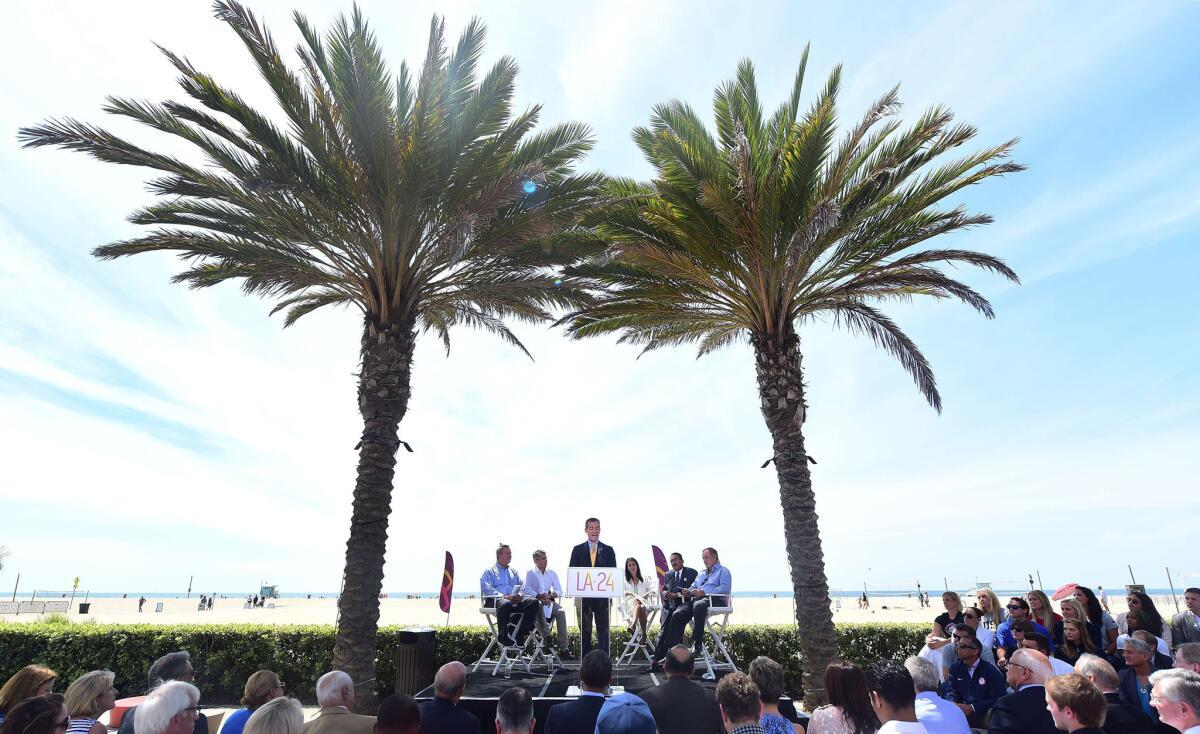LA24 Olympic bid has something different: optics but no delusions

Mayor Eric Garcetti addresses the audience on a stage at the Annenberg Beach House in Santa Monica after the City Council voted unanimously to go forward with a bid to host the 2024 Summer Olympic Games.
- Share via
A dozen or so young women arrived at Santa Monica State Beach shortly before noon and split into groups to play volleyball on the sand.
It occurs every day along the Southern California coast, but there was nothing impromptu or happenstance about their presence on this particular morning.
The women belonged to a club team that had been invited by the U.S. Olympic Committee. They were handed bright red caps and situated within camera range of a podium where, a few minutes later, officials announced that Los Angeles would be the U.S. bidder for the 2024 Summer Games.
“This place is important to the Games because we’ll bring beach volleyball back to the very beach where it was founded,” Los Angeles Mayor Eric Garcetti said. “We’ve changed the face of sports.”
Tuesday’s news conference was nothing if not thoroughly orchestrated, offering a first glimpse at the strategy LA24 bid leaders will employ over the next two years.
Amid the standard platitudes, Garcetti and sports executive Casey Wasserman, who will head the bid committee, continually circled back to a handful of themes aimed at winning an International Olympic Committee vote in 2017.
“The process in front of us is clear,” Wasserman said.
It could be difficult to stand out in a crowd of international contenders that includes Paris, Rome, Budapest and Hamburg. A key element in LA24’s pitch will be how economical it can make the Games.
Eighty-five percent of the stadiums and arenas in the city’s bid are already built. Holding construction to a minimum would seem to fit with the IOC’s recent “Agenda 2020” reform package that seeks to make bidding for and hosting the Games less expensive.
Not everyone expects change from an IOC membership that has traditionally gravitated to flashy, expensive proposals. The Los Angeles bid seems ready to challenge the sincerity of the reforms.
“The Olympic movement is looking to partner with cities to create a new hosting model, a model that sheds excessive spending,” USOC Chief Executive Scott Blackmun said. “We see the framework for an ideal matchup.”
A financially reasonable plan might nudge Los Angeles past the likes of Budapest and Hamburg, which would require an array of new venues to accommodate the massive, 17-day competition. It would not count for as much against the current frontrunner, Paris, and its vast infrastructure.
So LA24 leaders appear eager to sell the notion that younger audiences will relate to Southern California more than they would to traditional European cities.
The beaches and the movie industry play into that theme. So does an unorthodox athletic scene.
“We see it in the sports we invent here,” Garcetti said. “From beach volleyball to BMX to some of the things that may come down the pipeline — no pun intended — like surfing.”
Again, this might appeal to an IOC that has adopted new sports in its quest to be relevant with a younger generation of fans.
Sports aside, the Los Angeles bid has other challenges, including a global perception that U.S. politics and the Olympic Games don’t always mix.
Chicago stumbled in its campaign for the 2016 Summer Games after Mayor Richard Daley balked at signing the host city contract. An erstwhile Boston bid hit the same trouble last spring with opposition from residents worried about cost overruns.
In Los Angeles, the City Council spent the past week debating the LA24 bid, demanding the right to review future expenditures and contracts. USOC Chairman Larry Probst dismissed the idea that IOC voters might be scared away.
“I don’t think it’s a hindrance at all,” he said. “I think the IOC will see it as a reasonable process.”
Midway through Tuesday’s news conference, City Council President Herb Wesson took the microphone to emphasize that — despite lingering concerns — the council voted 15-0 to authorize Garcetti pursuing the bid.
“The city basically told the world that we are 100% partners with the mayor in this endeavor,” Wesson said. “As a council, we are certain we will do whatever is necessary to move this bid forward.”
It is still early and bids tend to change significantly over time. LA24 leaders — who were scheduled to be at IOC headquarters in Switzerland on Thursday — seem to understand that the rest of the process might not be as easy to control as Tuesday’s postcard media event.
As Wasserman said: “It’s time to get to work.”
Twitter: @LATimesWharton
More to Read
Go beyond the scoreboard
Get the latest on L.A.'s teams in the daily Sports Report newsletter.
You may occasionally receive promotional content from the Los Angeles Times.







